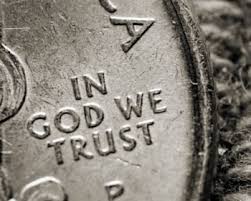History shows that "God" (the proper name of the Christian god) refers to a
singular god of a singular religion. Many of them have a theocratic bent in
wanting the country to be recognized as a Christian country. This is the best
they can do....so far. And so they cling to it, despite 1st Amendment problems.
A post from another thread....
Think the motto is about tradition?
Nay, it's mostly about anti-atheism & anti-communism.
It was made law
by Christians
for Christians.
Some history...
1776
"The...motto was suggested in 1776 by
Pierre Eugene du Simitiere to the committee responsible for developing the seal. At the time of the
American Revolution..."
1782
"
E pluribus unum..."One out of many"...a 13-letter traditional motto of the
United States, appearing on the
Great Seal....and adopted by an Act of Congress in 1782...."
1787
"The
Fugio Cent is the first official one-cent piece of United States currency."
"On April 21, 1787, the
Congress of the Confederation of the
United States authorized a design for an official copper
penny...later referred to as the
Fugio cent because of its image of the Sun and its light shining down on a sundial with the caption, "Fugio" (
Latin:
I flee/fly). This coin was reportedly designed by
Benjamin Franklin; as a reminder to its holders, he put at its bottom the message, "Mind Your Business."..."
It also had the motto which I find best.....
"We Are One"
Clear advantages...
- It's secular.
- It's in English
- It means (or should mean) something to all citizens.
1795
"...
E pluribus unum was first used on U.S. coinage in 1795, when the reverse of the
half-eagle ($5 gold) coin presented the main features of the
Great Seal of the United States.
E pluribus unum is inscribed on the Great Seal's scroll."
1798
"The motto was added to certain silver coins in 1798, and soon appeared on all of the coins made out of precious metals (gold and silver)."
1834
"In 1834, it was dropped from most of the gold coins to mark the change in the standard fineness of the coins. In 1837, it was dropped from the silver coins, marking the era of the Revised Mint Code."
1863
"In December 1863,
Abraham Lincoln's Secretary of the Treasury decided on a new motto, "In God We Trust," to engrave on U.S. coins. Lincoln's involvement in this decision is unclear."
1865
"An Act of Congress passed on March 3, 1865, allowed the Mint Director, with the Secretary's approval, to place the motto on all gold and silver coins..."
1873
"In 1873, Congress passed the Coinage Act, granting that the Secretary of the Treasury "may cause the motto IN GOD WE TRUST to be inscribed on such coins..."
"An Act of February 12, 1873 made the inscription a requirement of law upon the coins of the United States.
E pluribus unum appears on all coins currently being manufactured..."
1956
"....
E pluribus unum was considered a
de facto motto of the United States...until 1956 when the
United States Congress passed...H. J. Resolution 396...adopting "
In God We Trust" as the
official motto...."
"During the
Cold War era, the government of the United States sought to distinguish itself from the
Soviet Union, which promoted
state atheism and thus implemented
antireligious legislation....The
84th Congress passed a joint resolution "declaring IN GOD WE TRUST the national motto of the United States". The resolution passed...unanimously and without debate...The law was signed by President
Eisenhower on July 30, 1956.
[32] The United States Code at
36 U.S.C. § 302, now states: "'In God we trust' is the national motto."
...the President signed into law...a requirement that "In God We Trust" be printed on all U.S. currency and coins...."
Ref....
In God We Trust - Wikipedia
E pluribus unum - Wikipedia
Fugio Cent - Wikipedia

